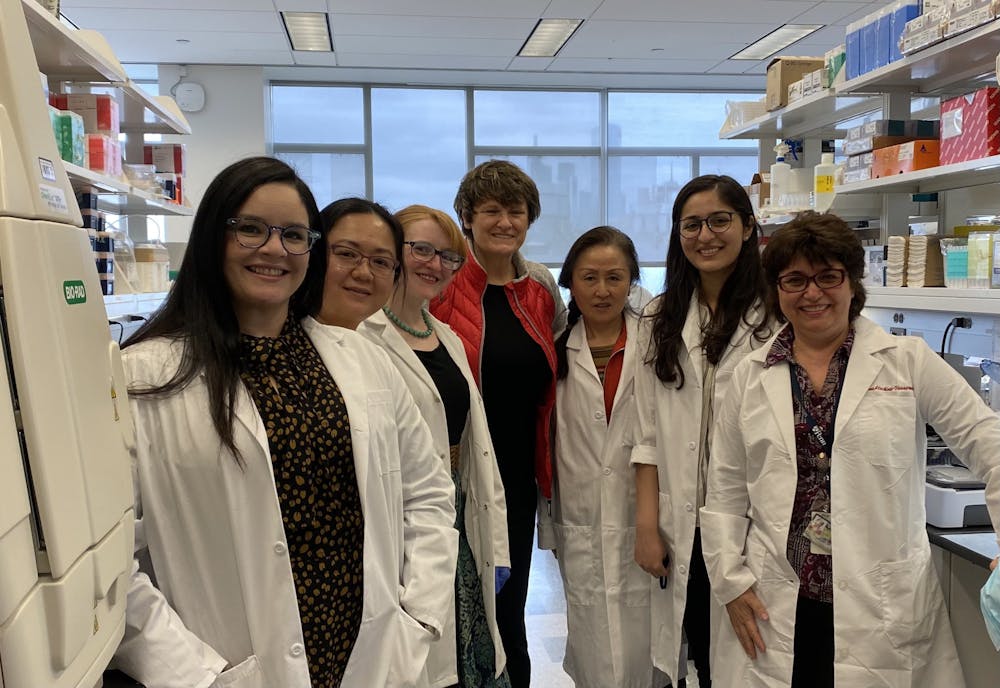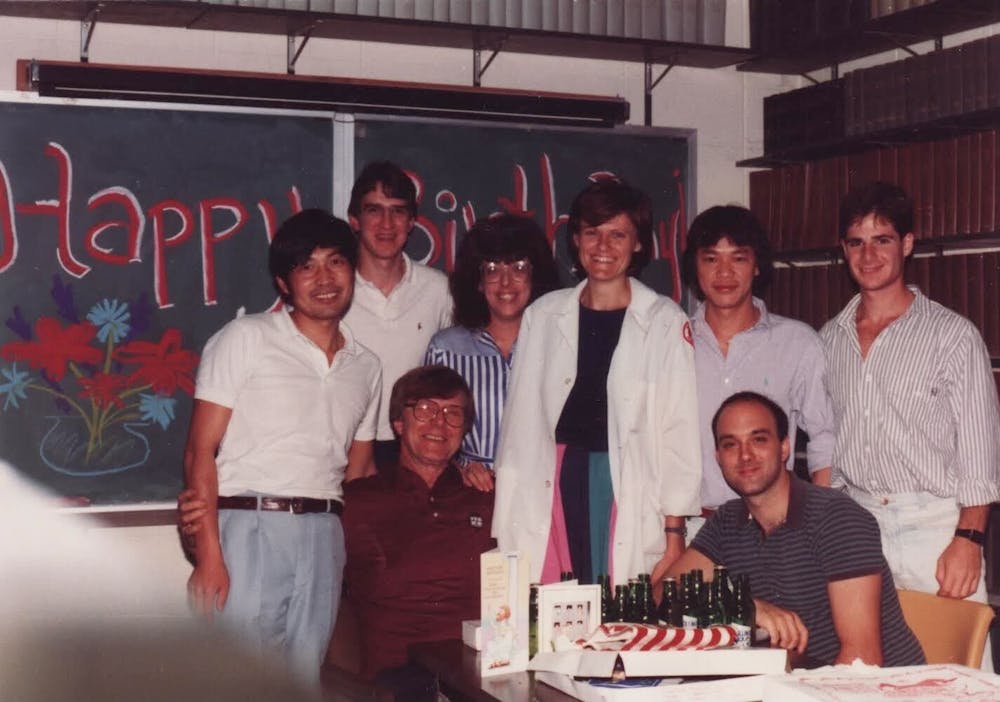Three weeks ago, Penn hosted a flash mob for Katalin Karikó after she won the 2023 Nobel Prize in Medicine. But the celebration masked a tumultuous, decades-long relationship between Karikó and the University.
Karikó, an adjunct professor of neurosurgery at the Perelman School of Medicine, won the Nobel Prize in Medicine for her past research into mRNA technology alongside co-laureate and Roberts Family Professor in Vaccine Research at the Medical School Drew Weissman. Karikó and Weissman's research was critical for the development of the COVID-19 vaccines — from which Penn has earned around $1.2 billion.
"At a University built around [a] Franklin spirit, there are no better exemplars of these character traits than our Nobel laureates, Dr. Kati Karikó and Dr. Drew Weissman," Penn President Liz Magill said at a press conference the day the prize was named.
However, eight current and former colleagues of Karikó told The Daily Pennsylvanian that — over the course of three decades — the University repeatedly shunned Karikó and her research, despite its groundbreaking potential.
The colleagues told a story of a researcher whose work ethic helped her succeed against all odds — including doubtful administrators, language barriers, and a system that cuts costs by demoting researchers who fail to earn grant funding.
"We acknowledge and are grateful for the valuable contributions Dr. Karikó has made to science and to Penn throughout her time with the University," a University spokesperson wrote in a statement to the DP.
In 1989, four years after she arrived in the United States, Karikó was appointed an adjunct professor at the Medical School. She worked on mRNA research under cardiologist Elliot Barnathan until his departure in 1997.
From the very beginning of her time at Penn, Karikó's research was overlooked by medical school executives, she wrote in her recently published memoir, "Breaking Through: My Life in Science." These executives included Jim Wilson, the director of Penn’s embattled Gene Therapy Program, and Judith Swain, chief of cardiovascular medicine. Wilson remains a member of Penn's faculty.
Wilson did not respond to a request for comment.
“[Jim] Wilson never seemed interested in mRNA or my research," Karikó wrote. "He barely glanced my way; on the rare occasions he did, it always felt as if he were looking right through me."
After Karikó unsuccessfully appealed to Wilson for her research to be included in an upcoming grant, Swain requested that Karikó not attend similar meetings in the future — and asked Karikó to stop speaking to her Hungarian colleague in their native language.
"She told me 'people' were complaining about me, saying that I was too difficult," Karikó wrote of a time she was called to Swain's office.
During these early years, Karikó wrote that Penn prevented her from having access to basic lab supplies, such as deionized water. All of her grant applications for future research, directed at private and government agencies and the University Research Foundation, were also denied.
Five years into her tenure at Penn, Karikó was informed that she would not be promoted to the position of research associate professor, the typical stepping stone for researchers with her level of experience. In 1997, Barnathan, her supervisor, left the University, leaving Karikó without a clear path forward.
"[I had] no grants, no funding, [and] no respect from anyone with any formal power,” she wrote.

After Barnathan left, Karikó was helped by a colleague, David Langer — now the chair of neurosurgery at New York’s Lenox Hill Hospital. Langer convinced the chair of Penn's neurosurgery department to hire Karikó as the department's senior head of research.
“If she wasn’t hired, there may not have been a COVID vaccine," Langer said.
Even at that early point in her career, Langer said he was confident that Karikó would make substantial strides in the field of mRNA.
“She is incredibly hardworking, just insane,” Langer said. "And she’s a genius, so eventually she was going to solve this problem, whether with me or with someone else.”
Not long after, Karikó met Drew Weissman, her future research partner and co-Nobel Prize laureate, during a chance encounter at a copy machine. Karikó and Weissman began to cooperate on research into mRNA technology.
2001 College graduate David Scales — now an assistant professor of medicine at Weill Cornell Medicine — worked in Karikó and Weissman’s lab as an undergraduate student at Penn. Scales said that he was surprised by the funding challenges faced by Karikó and other talented scientists.
“It was weird to me to see this idea that they’re only going to fund you for a short amount of time, and if you’re not able to get external grants, then they’re going to wash their hands with you and say good luck," he said.
In 1999, Sean Grady — now the chair of the neurosurgery department — arrived at Penn and immediately sought to revisit the department's existing allocation of resources.
“Not long after arriving, Sean sat me down,” Karikó wrote. “He observed that I’d had some publications in reputable, if small, journals. But, he said, he was under tremendous budgetary pressure and was concerned about my lack of funding.”
Over the following years, Grady repeatedly critiqued Karikó — paying minimal attention to her research in favor of the metrics used by Penn to evaluate her success, such as publication records, citations, and funding.
“Unless something changes, this isn’t going to go well," Grady told Karikó, according to her memoir.
Grady and others within Penn Medicine aimed to maximize the returns on their investments in individual researchers, Langer said.
To Grady, $35,000 spent on Karikó was "$35,000 that could be spent supporting a new scientist who may make a discovery," Langer added.
In 2005, Karikó and Weissman jointly made the discovery that would later win them the Nobel Prize, receiving minimal recognition from the academic community at the time.

Robert Sobol, a professor who worked with Karikó at Temple University before she moved to Penn, said that the development was "groundbreaking" in retrospect.
“Karikó and I started investigating RNA in the late 1990s, and we figured out what made it so inflammatory and how to get rid of the inflammation. We published that research in 2005,” Weissman previously told the DP. “That is when people, at least academics, started to get interested in its potential, and companies started to get interested in it around 2010.”
Karikó told the DP in 2020, as the first COVID-19 vaccines became available to Penn Med's frontline health workers and researchers, that she knew the the discovery in 2005 would lead to major developments in the future.
“When I discovered the potential of the RNA, I had a feeling that it could be anything,” Karikó told the DP. “But nobody believed, so I couldn’t release that feeling.”
Her former colleague Norbert Pardi, who is now an assistant professor in Penn’s Department of Microbiology, said that Karikó and Weissman's work ethic motivated the entire lab to work harder.
Penn was eventually awarded a patent for the modified RNA developed by Karikó and Weissman, enabling the University to have the final say in how the patent would be licensed. To control the direction of future research, Karikó and Weissman sought to purchase the patent themselves — but it was sold in its entirety to a different company.
Karikó requested to be reinstated to a faculty position at Penn in 2010 but was initially rejected. Karikó wrote that administrators told her that she was "not of faculty quality" — citing how individuals who have previously been demoted can not be promoted back to the faculty track.
After Karikó appealed the decision and rejoined the faculty, colleagues said that Grady continued to undermine Karikó. But it was the removal of her lab space that pushed Karikó to leave Penn, according to an employee close to Karikó who requested anonymity due to fear of retaliation from the University.
“She was kicked out of her lab so many times, but she made something good out of all of these failures," Éva Remenyik, a Hungarian dermatologist close to Karikó, said.
In 2013, Karikó said she returned to her lab after spending time away to find all of her belongings having been packed, moved, and misplaced at Grady's direction. Karikó then left Penn's campus to work at BioNTech, a German company that focuses on mRNA-based technologies later that year.
Langer told the DP that many of Karikó’s superiors may not have recognized the impacts of her research and potential successes.
“People didn't necessarily see her as who she was going to become,” Langer said. “Michael Jordan was overlooked by two teams and is the greatest basketball player of all time, [and] Tom Brady was drafted 199th. The value and the ultimate success of somebody is not always readily apparent, even when it’s right in front of your eyes.”
Scales also said that Penn's approach of giving minimal funds to Karikó followed a similar model to most peer institutions. He said many research institutions provide some degree of startup funds, and the expectation is for researchers to acquire external grants otherwise.
All of those interviewed commended Karikó for winning the Nobel Prize alongside Weissman.
“I think it’s a testament to her fortitude,” Sobol said. “Now that you look back on the calendar, you see that she was 20 years ahead of where everyone is now.”
Scales said he hopes that Karikó's win will prompt changes to funding allocations in research.
“I do hope that it causes Penn and a bunch of other institutions that fund science this way to reflect a little bit on what the chances are that some scientists who do not get funding, and wind up leaving, end up being like Katalin Karikó,” Scales said.
The Daily Pennsylvanian is an independent, student-run newspaper. Please consider making a donation to support the coverage that shapes the University. Your generosity ensures a future of strong journalism at Penn.
Donate





Most Read
Former Penn swimmers applaud Department of Education ruling that Penn violated Title IX
Department of Education issues Penn demands after finding University violated Title IX
‘A travesty’: Penn faculty, alumni express concern over proposed Fulbright scholarship funding cut
More Like This